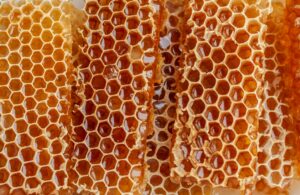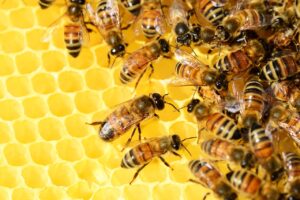Nature’s Liquid Gold
Did you know honey can be stored for eternity? There’s so much more to honey than its sweet taste. Many institutions recognize honey for its amazing health benefits and versatility, from relieving sore throats to mending surgical wounds. This seemingly innocent food has taken the medical and dieting communities by storm. From being prized by ancient civilizations to being eaten for breakfast every morning, this food has a lot going for it. In this post, I’ll delve into all the amazing properties that this magical food has to offer, taking a look at everything including its healing powers to its role in the environment.
Healing Properties
Honey has countless heath and medical related benefits, some of which include antibacterial, and anti-inflammatory properties, as well as digestive heath, and wound healing. In fact, it is especially common for doctors and other health care professionals to recommend honey as a medical treatment for things like wounds or a sore throat. There is even special medical grade honey used to help treat more serious burns or cuts. By taking a closer look at how honey is able to do all these incredible things, we can uncover the science behind what makes this food so amazing.
Antibacterial
Honey has low moisture content, high sugar concentration, and a high acidity, all of which causing a very poor environment for any bacteria to thrive in, giving honey it’s antibacterial properties.
Anti-inflammatory
With the ability to reduce swelling and soothe irritation, honey can act as the perfect anti-inflammatory response, it contains many antioxidants that can help neutralize harmful molecules that trigger inflammation. It also acts as a sort of protective barrier on the inflamed or irritated area, protecting it from any further damage and reducing the pain the injury has caused.
Digestive health
Not only can honey coat the lining of your digestive system, easing pain and reducing issues like acid reflux, but it also contains prebiotics. Raw honey in particular contains oligosaccharides that act as prebiotics. A prebiotic is a type of fiber that has the ability to feed the good bacteria in our gut. Our guts are full of both good and bad bacteria. The good bacteria we call probiotics and prebiotics are kind of like food for our helpful probiotics. Taking care of the probiotics in our gut helps to strengthen and support our immune system, as well as aid digestion and promote general bowel movements.
Wound healing
With a mix of antibacterial and anti-inflammatory properties, honey has great wound healing capabilities. As mentioned earlier, medical-grade honey is a very common substance used to treat wounds. Medical-grade honey differs from regular honey as it is sterilized and processed to ensure there are no contaminants. It typically undergoes a lot of testing to meet specific medical standards. Manuka honey is one of the most popular and well-known types of medical-grade honey. Native to New Zealand, it contains unique compounds that give it even stronger healing properties.

Lasts forever
Honey has an incredibly long shelf life. When stored properly, it can last for centuries. There have even been reports of archaeologists finding pots of honey in ancient Egyptian tombs that were estimated to be over 3,000 years old. That being said, you’re probably wondering how a food product can last that long. There are actually many scientific properties found in honey that give it such a long lifespan. Firstly, honey has a very low moisture content. Honey is considered hygroscopic, which is a term that refers to substances that typically absorb moisture from the air. This, combined with its incredibly low water content, creates a very harsh environment for any bacteria or yeast to grow. As a result, its shelf stability increases because the chances of it rotting or souring become almost impossible. In addition, honey has a high sugar concentration, which, paired with its high acidity, increases its overall defense against bacteria. This creates a harsh environment for bacteria or mold to thrive due to the osmotic pressure and the acidic nature of the honey. As mentioned, one of the main reasons honey can last forever is because of its low water content. However, if water does get in, yeast can start to grow and ferment, causing it to go bad. In order to preserve it for as long as possible, it is important to keep it tightly sealed and stored in a cool, dry place. So, if honey can last a long time, then why does the honey you buy from the store typically have an expiration date? Food items are always required to have a best-before date for legal and marketing reasons. Typically, a label from the store will say best before 1 to 2 years. However, if you store it properly and have pure, real honey, it can last for basically forever.
Incredible for the ecosystem

Not only is honey notably good for humans, but it’s also amazing for the ecosystem. While honey does not directly affect the ecosystem, it plays a huge part in pollination across the entire environment. Honey is the bee’s primary food source. Being a food source for such a beneficial insect makes honey important by association. Bees pollinate plants, allowing said plants to reproduce and provide more food for animals that feed on those plants. Many plants and crops rely heavily on pollination. If you’ve ever tried to grow a houseplant, you know that in order for it to grow indoors, you need to manually rub the pollen from flower to flower because there are no bees inside your house. This shows just how important bees are for nature, since if they were not there, nothing would be able to grow as no pollen would be spread around. While you could argue that birds can spread pollen too, they are much less specialized for the pollination role and are only secondary to bees as primary pollinators. Honey, acting as a food source for the bees, allows them to do their job, which in return does wonders for the ecosystem.
Overall TL;DR
Overall, honey is a powerful food with antibacterial, anti-inflammatory, and wound-healing properties. It can last for nearly an eternity and supports the ecosystem by nourishing bees.
